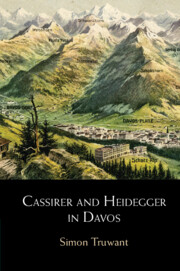Cassirer and Heidegger in Davos
The 1929 encounter between Ernst Cassirer and Martin Heidegger in Davos, Switzerland is considered one of the most important intellectual debates of the twentieth century and a founding moment of continental philosophy. At the same time, many commentators have questioned the philosophical profundity and coherence of the actual debate. In this book, the first comprehensive philosophical analysis of the Davos debate, Simon Truwant challenges these critiques. He argues that Cassirer and Heidegger's disagreement about the meaning of Kant's philosophy is motivated by their different views about the human condition, which in turn are motivated by their opposing conceptions of what the task of philosophy ultimately should be. Truwant shows that Cassirer and Heidegger share a grand philosophical concern: to comprehend and aid the human being's capacity to orient itself in and towards the world.
- The first detailed analysis of the controversies in the 'Davos debate', a founding moment of continental philosophy
- Clarifies a number of notoriously difficult aspects of Cassirer's philosophy of culture and Heidegger's early thought
- A new take on the history of twentieth-century philosophy, through examining two major thinkers of the period
Reviews & endorsements
‘Simon Truwant's book provides a rigorous and clear analysis of the philosophical issues that distinguished the positions of Ernst Cassirer and Martin Heidegger during their epoch-making debate at Davos in 1929. His original work provides an important contribution to enriching our understanding of the genealogy and the dynamics of twentieth century thought.' Jeffrey A. Barash, Université de Picardie Jules Verne
‘Truwant's book should be the starting point for anyone interested in the philosophical meaning of the famous ‘debate' between Heidegger and Cassirer in Davos. Going far beyond the debate itself, the book offers a lucid, meticulously researched account of the philosophical positions Heidegger and Cassirer brought to the debate, an astute analysis of their relation to Kant, and a thoughtful assessment of the implications for philosophy today. A first-rate achievement.' Steven Crowell, Rice University
‘Truwant’s excellent book is … not only an essential contribution to the existing literature but also a spur for further research.’ Tobias Endres, Journal of the History of Philosophy
Product details
April 2024Paperback
9781009011440
274 pages
229 × 152 × 15 mm
0.403kg
Available
Table of Contents
- Introduction: what is at stake in the Davos debate?
- 1. Reconstructing the Davos debate
- Part I. The Lasting Meaning of Kant's Thoughts:
- 2. Cassirer's transformation of the critique of reason into a critique of culture
- 3. Heidegger's reading of transcendental philosophy as phenomenological ontology
- 4. Receptivity or spontaneity: two readings of the Critique of Pure Reason
- Part II. 'What Is the Human Being?':
- 5. Cassirer's functional account of the 'animal symbolicum'
- 6. Heidegger's existential analytic of 'Dasein'
- 7. Infinity and finitude: the quest for existential orientation
- Part III. The Task of Philosophy:
- 8. Cassirer's functional conception of philosophy
- 9. Heidegger's hermeneutic conception of philosophy
- 10. Enlightenment or therapy: the cosmopolitan task of philosophy
- Conclusion: the terminus a quo and terminus ad quem of the Davos debate.



